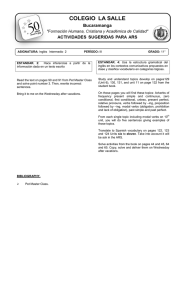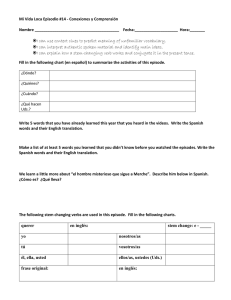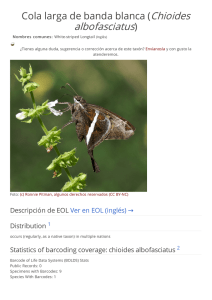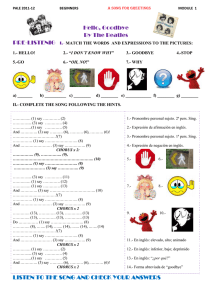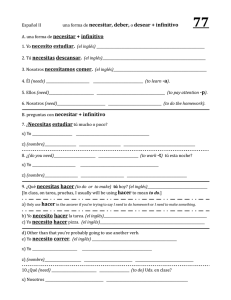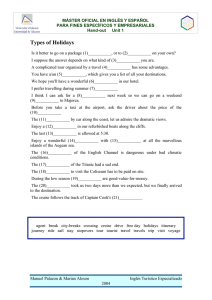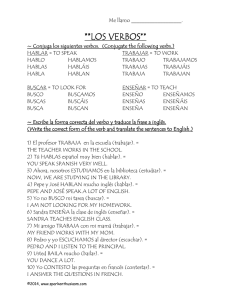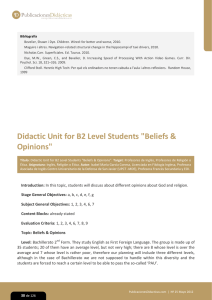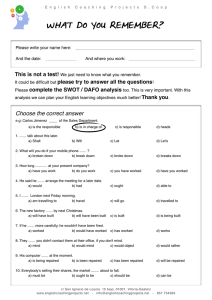33. alejarse –to move away 39. darse prisa –to hurry 40. hacerse
Anuncio
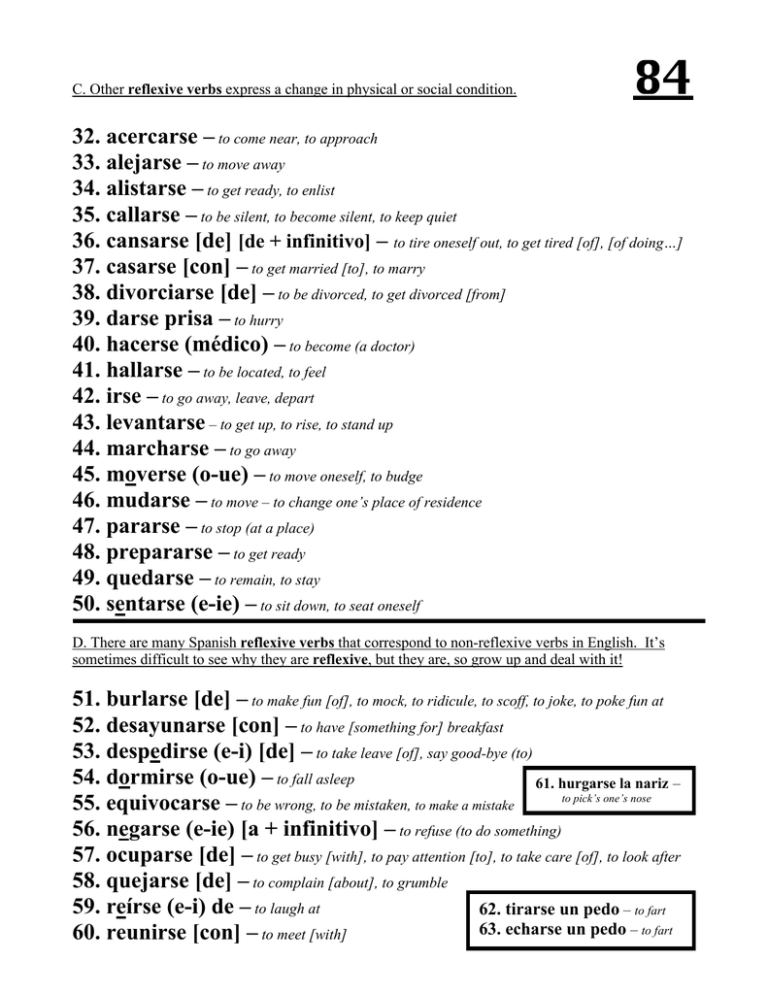
C. Other reflexive verbs express a change in physical or social condition. 84 32. acercarse – to come near, to approach 33. alejarse – to move away 34. alistarse – to get ready, to enlist 35. callarse – to be silent, to become silent, to keep quiet 36. cansarse [de] [de + infinitivo] – to tire oneself out, to get tired [of], [of doing…] 37. casarse [con] – to get married [to], to marry 38. divorciarse [de] – to be divorced, to get divorced [from] 39. darse prisa – to hurry 40. hacerse (médico) – to become (a doctor) 41. hallarse – to be located, to feel 42. irse – to go away, leave, depart 43. levantarse – to get up, to rise, to stand up 44. marcharse – to go away 45. moverse (o-ue) – to move oneself, to budge 46. mudarse – to move – to change one’s place of residence 47. pararse – to stop (at a place) 48. prepararse – to get ready 49. quedarse – to remain, to stay 50. sentarse (e-ie) – to sit down, to seat oneself D. There are many Spanish reflexive verbs that correspond to non-reflexive verbs in English. It’s sometimes difficult to see why they are reflexive, but they are, so grow up and deal with it! 51. burlarse [de] – to make fun [of], to mock, to ridicule, to scoff, to joke, to poke fun at 52. desayunarse [con] – to have [something for] breakfast 53. despedirse (e-i) [de] – to take leave [of], say good-bye (to) 54. dormirse (o-ue) – to fall asleep 61. hurgarse la nariz – to pick’s one’s nose 55. equivocarse – to be wrong, to be mistaken, to make a mistake 56. negarse (e-ie) [a + infinitivo] – to refuse (to do something) 57. ocuparse [de] – to get busy [with], to pay attention [to], to take care [of], to look after 58. quejarse [de] – to complain [about], to grumble 59. reírse (e-i) de – to laugh at 62. tirarse un pedo – to fart 63. echarse un pedo – to fart 60. reunirse [con] – to meet [with] E. When we translate these reflexive verbs, we don’t have to translate it literally. Write it how you would say it in English. (84 de atrás) 1. Me afeito a las siete. (literal) I shave myself at 7:00. (el ingles) I shave at 7:00. 2. The me lets us know that I’m talking about myself. If I don’t have the me, it means that I shave someone or something else – u! u! u! u! 3. Me llamo Bob. (literal) _________________________ (el inglés) ___________________________ 4. Mi padre se baña por la noche. (el inglés) _______________________________________________ 5. Nosotros nos preocupamos de la prueba. (el inglés) _______________________________________ 6. Te perfumas por la mañana. (el inglés) _________________________________________________ 7. Ellos se alejan de la pizarra. (el inglés) _________________________________________________ 8. El profesor no se equivoca nunca. (el inglés) _____________________________________________ F. Completa el español. 1. Yo (a-go to bed) _____ _____________________ (at …) ___ _____________________________ 2. Tú (d-shower) _____ _______________________ por la __________________________. 3. Mi padre (d-wakes up) _____ _____________________ (at …) ___ _________________________ 4. Ellos (a-get bored) _____ _______________________ (in the ..) ____ ____ ___________________ 5. Nosotros (d-have fun) ______ ________________________ (in the..) ____ ____ _______________ 6. Vosotros (e-get angry) _____ __________________________. 7. Yo (p-worry about …) _____ _______________________ _____ _________________________ 8. Tú (d-are in a hurry) _____ _____________ ___________________. 9. Ella (m-moves to the left) _____ __________________ ___ ____ ________________________. 10. Nosotros (s-sit down) ______ ________________________________. 11. Ellos (b-make fun of…) _____ ________________________ _____ ______________________. 12. Yo (d-have coffee for breakfast) _____ ______________________ ______ _______________. 13. Vosotros (n-refuse to participate) _____ ____________________ ___ ____________________. 14. Los estudiantes (q-don’t complain) _____ _____ ____________________ (never) _____________.
